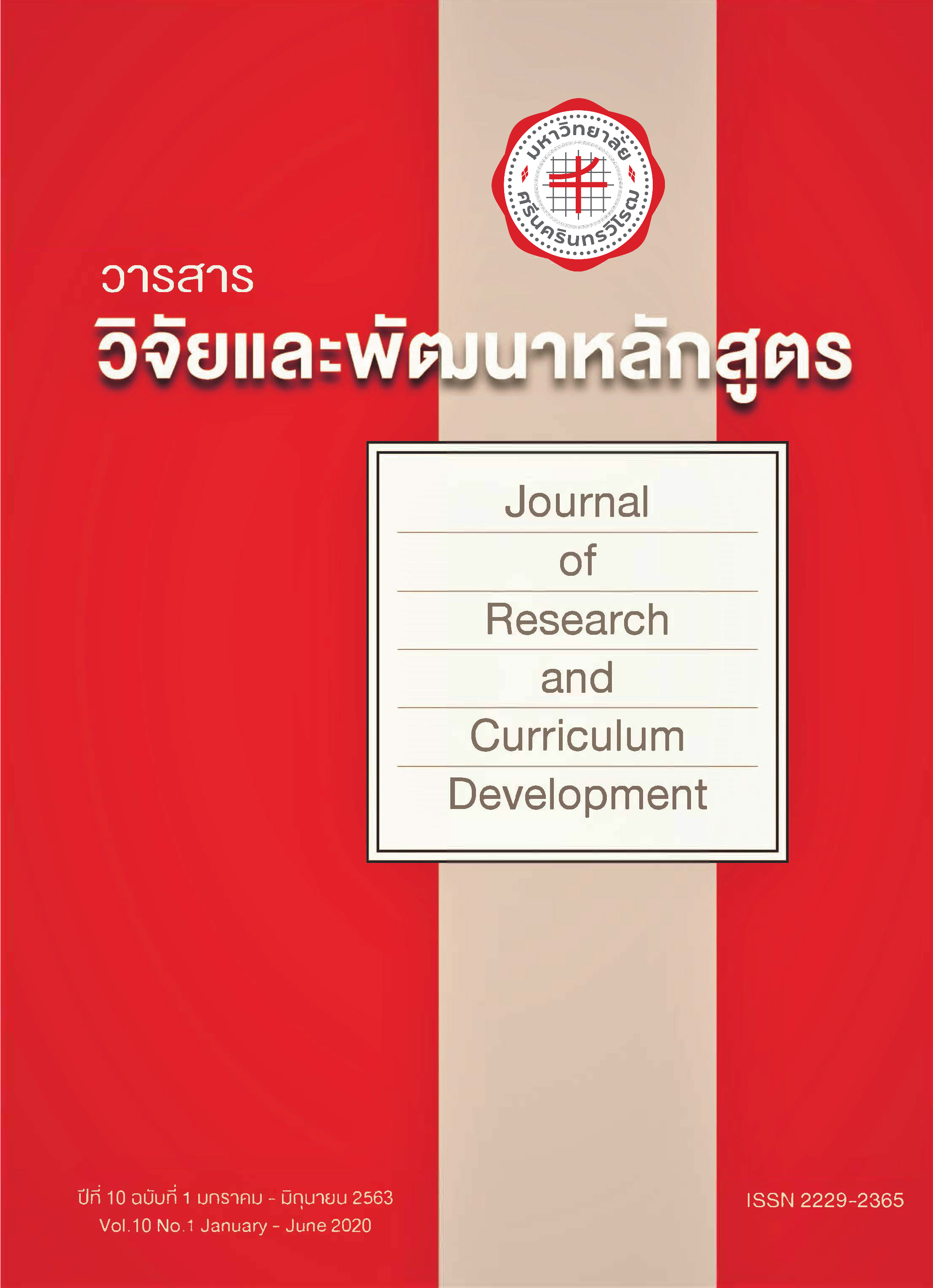การพัฒนากิจกรรมการเรียนการสอนที่เสริมสร้างความสามารถในการใช้ตัวแบบเชิงคณิตศาสตร์เพื่อแก้ปัญหาสถานการณ์ในชีวิตประจำวัน สำหรับนักศึกษาชั้นปีที่ 1 ระดับปริญญาตรี
Keywords:
Mathematical Model, Mathematics modeling, Instructional activities to enhance the ability to apply mathematical modelsAbstract
The purposes of this research are as follows: (1) to develop instructional activities to enhance the ability to apply mathematical models to solve problems in daily life for first-year students with an efficiency criteria of 60/60; (2) to study the effects on mathematical modeling among students; and (3) to study the effects on their performances in terms of mathematical modeling. The target group consisted of 28 students enrolled in the Mathematics in Daily Life course at Rajamangala University of Technology Tawan-ok Uthenthawai Campus in first semester academic year 2019. They were selected by purposive sampling method and 4 of them were chosen for in-depth analysis. The research instruments consisted of (1) the lesson plans to enhance their ability to apply mathematical models to solve problems in daily life, (2) the mathematical modeling test (3) the observation forms about the mathematical modeling and (4) the interview forms about the mathematical modeling. Quantitative and Qualitative research methodology was employed in collecting and analyzing data.
The results of the study were as follows: (1) the efficiency criterion of the instructional activities enhanced mathematical modeling for the first-year students at 60/60. The average was 70.30/69.10; (2) based on their scores on the test and tasks, it was found that the number of students who scored higher than sixty percent was over sixty percent of the total number of students at a 0.05 level of significance; (3) during the course of this teaching activity, students could experience using mathematical models to solve daily life problems and they could develop their abilities to understand the data or conditions of given daily life problems. As the result, they could transform daily life problems into mathematical problems. In addition, they could apply a mathematical model to solve mathematical problems and interpreted solutions to the problem as a daily life problem, and their answers were correct.
References
รุ่งฟ้า จันท์จารุภรณ์. (2555). กิจกรรมส่งเสริมทักษะและกระบวนการทางคณิตศาสตร์ ประมวลสาระชุดวิชา การจัดประสบการณ์การเรียนรู้คณิตศาสตร์. นนทบุรี: บัณฑิตศึกษา สาขาวิชาศึกษาศาสตร์ มหาวิทยาลัยสุโขทัยธรรมาธิราช.
วรณัน ขุนศรี. (2546, พฤษภาคม-กรกฎาคม). ตัวอย่างการจัดกิจกรรมการเรียนการสอนที่นำไปสู่การแก้ปัญหา. วารสารคณิตศาสตร์, 47(536-538), 9-25.
ศักดา บุญโต. (2552). แนวความคิดทางคณิตศาสตร์ เอกสารการสอนชุดวิชา ความคิดเชิงวิเคราะห์. นนทบุรี: สาขาวิชาศึกษาศาสตร์ มหาวิทยาลัยสุโขทัยธรรมาธิราช.
ศันสนีย์ เณรเทียน. (2560, เมษายน-มิถุนายน). การเรียนรู้คณิตศาสตร์ผ่านปัญหาในชีวิตจริงที่เน้นการสร้างแบบจำลองทางคณิตศาสตร์. วารสารครุศาสตร์, 45(2),283-253.
สถาบันส่งเสริมการสอนวิทยาศาสตร์และเทคโนโลยี. (2555). ทักษะและกระบวนการทางคณิตศาสตร์. กรุงเทพฯ: 3-คิว มีเดีย.
สำนักงานพัฒนาคุณภาพการศึกษา มหาวิทยาลัยเชียงใหม่. (2559). คู่มือวิชาศึกษาทั่วไป มหาวิทยาลัยเชียงใหม่. สืบค้น 20 ธันวาคม 2559, จาก http://www.eqd.cmu.ac.th
สุรสาล ผาสุข. (2546). การศึกษาความสามารถและการคิดเกี่ยวกับการใช้ตัวแบบเชิงคณิตศาสตร์และผลในด้านเจตคติต่อวิชาคณิตศาสตร์ของนักเรียนในระดับชั้นมัธยมศึกษาตอนปลาย. (ปริญญานิพนธ์ กศ.ด. (คณิตศาสตร์ศึกษา)), กรุงเทพฯ: บัณฑิตวิทยาลัย มหาวิทยาลัย
ศรีนครินทรวิโรฒ.
อัมพร ม้าคนอง. (2554). ทักษะและกระบวนการทางคณิตศาสตร์: การพัฒนาเพื่อพัฒนาการ. กรุงเทพฯ: ศูนย์ตำราและเอกสารทางวิชาการ คณะครุศาสตร์ จุฬาลงกรณ์มหาวิทยาลัย.
Ang, Keng Cheng. (2009). Mathematical Modelling in Secondary & Junior College Classroom. Singapore: Pearson Education South Asia.
Cirillo., Michelle., & et al. (2016). Annual Perspectives in Mathematics Education 2016: Mathematical Modeling and Modeling Mathematics. Reston, Virginia: The National Council of Teachers of Mathematics..
Dossey, John A. (1996). Mathematics, Pedagogy, and Secondary Teacher Education. Portsmouth, NH: Heinemann.
Giordano, Frank R., Weir, Maurice., & Fox, William P. (2003). A First Course in Mathematical Modeling (3rd ed ed.). United States of America: Brooks/Cole.
Janjaruporn, R. (2005). The Development of a Problem-Solving Instructional Program to Develop Preservice Teachers’ Competence in Solving Mathematical Problems and Their Beliefs Related to Problem Solving. (Dissertation, Ed.D. (Mathematics Education)), Bangkok, Graduate School, Srinakharinwirot University,
Polya, G. (1957). How to Solve It. Princeton, New Jersey: Princeton University Press.
Swetz, Frank, & Hartzler, J.S. (1991). Mathematical Modelling in the Secondary School Curriculum : A Resource Guide of Classroom Exercises. Reston, Virginia: The National Council of Teachers of Mathematics, INC. p. 6.





